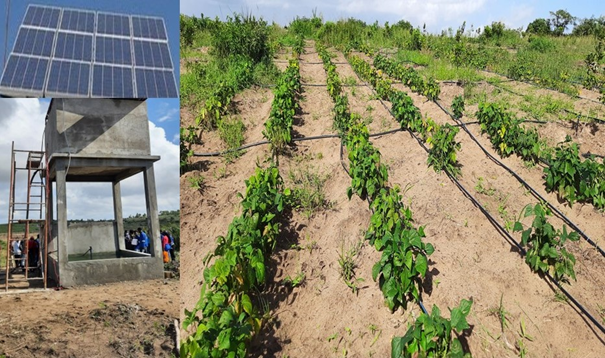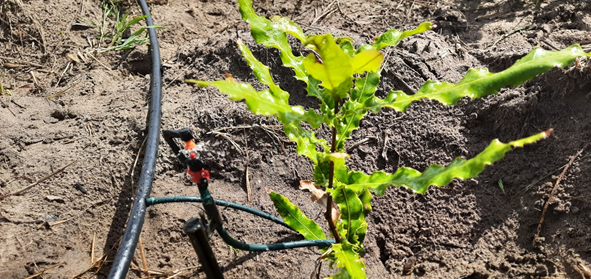Solar Irrigation system in Mozambique, SUPERKWICK LDA
42% of the Bilene district population uses open-pipe wells without pumps as a source of water and only 14% of households have access to electricity. 66.5% of households use Petrol/Paraffin/Kerosene as their main source of energy.
Limited access to energy and inadequate water supply are major barriers to the development of the district since all economic activities including agriculture depend on the availability of these two important resources. “There is too much work in our fields which requires water yet due to climate change it is very hard to experience consistent rains throughout the year. Access to technology like solar powered- solar pumps with less dependence on seasonal rains is a very vital solution to the challenges we face” --- Mr. Pelembe, representative of Bilene farmers at the District Council.
Agriculture in the district of Bilene Macia is practiced in family farms of 1.5 hectares, on average, and in a system of intercropping based on local varieties, with the use of animal traction and tractors in some regions. The main crops are cassava, maize, beans, peanuts, rice and vegetables, which form the basis of the families' diet. Cashew, mafurra and sugar cane are the main cash crops.
SuperKwick Lda cultivates a wide range of crops including macadamia, cashew, beans, and vegetables on a 10ha farm in Bilene-Macia, in Mozambique. Macadamia and cashew kernels have great potential for the foreign market, with national companies dedicated to processing them for export to markets such as the United States of America (USA) and European Union (EU) countries. The SuperKwick project aims to increase the availability of these raw almonds by promoting their cultivation in the district. These crops require a lot of water for irrigation during the planting phase, so the use of renewable energy to pump water to agricultural fields is an opportunity to ensure productive sustainability. The project also aims to promote the production of crops for domestic consumption, namely vegetables and cereals.
Location: Chilengue administrative post, Macia-Bilene, Maputo Province
Project Period: August, 2021-date (On going)
Total Funding: MZN 3,943,000. SuperKwick, received external financial support through the BCI-SUPER credit line that was established by UNIDO in partnership with BCI and FUNAE. The funding is provided as a loan with attractive terms and conditions including a fixed interest rate of 7.5%.
Stakeholders: Eduardo Mondlane University (capacity building and RE demonstration), SDAE-Bilene district (District Economic Activities services department), UNIDO (Funding and monitoring), GEF (Funding) and BCI (Credit line)
Project
In 2018, the company SuperKwick was granted by the district government a total area of 107 hectares to explore, but due to financial constraints and difficulties in establishing reliable irrigation systems, it only uses about 10 ha, to promote the production of macadamia and cashew for the external market. The company also plans to produce some crops to satisfy the national market, such as rice, potatoes, beans, peanuts and vegetables. This location was selected by SuperKwick because the district can easily attract investments due to favourable agro-ecological conditions for agriculture, attractive tourist conditions, favourable location in relation to the main markets (Maputo and South Africa), the existence of extensive land for economic activities and for the humble, hospitable and hardworking population of Bilene-Macia. SuperKwick had already installed a 2,275W solar irrigation system, but through the BCI-SUPER credit line, it will add a system capable of generating 2,515W for: (i) pumping water for irrigation with micro, medium sprinklers, direct irrigation, drip irrigation in vegetable fields, beans and rice for the domestic market; (ii) pumping water for irrigation of macadamia fields and promoting cashew cultivation for export.
The assembling of the system is done according to the orientation of the land as well as the water source. To assemble the system, pipes, emitters, sprinkler heads, valves, and reduction joints are the materials needed.
The micro-sprinkler irrigation system is used for irrigating the macadamia plants and this is determined by the hydric needs of each plant, which is 20 litres per day
“Since the system requires high and continuous power supply to enable the pumping of water which is consequently sprayed to the entire field, solar energy was found to be the most efficient and reliable source of energy for this purpose” – Ms Sheila Macie, Field activities coordinator.
In addition to the solar pumps, the upgraded irrigation system includes:
a. Installation of irrigation pipes for an area of 30 hectares;
b. Micro-irrigation system for an area of 10 hectares;
c. Drip irrigation system for an area of 5 hectares;
d. Installation of medium size sprinklers in an area of 5 hectares; e. Installation of a direct pumping system for a 10-hectare productive field.
Target Beneficiaries
The implementation of this project will bring benefits to the communities of Mhata and Chilengue in the district of Bilene, as it will serve as a benchmark for their migration from rainfed agriculture to irrigation agriculture, where production takes place throughout the year due to permanent availability of water. The practice of irrigation agriculture will have a direct impact on the food security of communities, increasing their income and production surpluses for commercialization. Superkwick has established contracts to supply to the following clients in the international market:
- Raw cashew nuts for Condor; (ii) Shelled chestnuts for Sunshine and (iii) raw macadamia nuts for Hello Choice company.
- In the national market: (i) beans, vegetables and cereals for the Praia do Bilene and Macia markets and (ii) raw rice for Macia Rice Husking Factory
O&M
SuperKwick's experience in designing, installing and carrying out maintenance of drip irrigation systems, using micro sprinklers, was fundamental to ensure the transfer of these technologies to the communities of Mhata and Chilengue. The project was based on the activities and experiences that the company was already developing, having simply expanded production to an area of over 30 hectares, which now has solar irrigation systems (SPIS).
Individual farmers, their associations, and small enterprises in the agricultural sector will benefit from skills on SPIS offered through the project. Besides, SuperKwik has been regularly receiving students from academic institutions in the provinces of Maputo and Gaza who conduct their practical classes and internships in this project, including the Instituto Superior de Gestão e Empreendedorismo Gwaza Muthini and the Escola Superior de Negócios e Empreendedorismo De Chibuto. During the assembly process of the main systems as well as in the operation, SuperKwick intends to introduce innovative technologies that will be transmitted directly to the company's permanent employees as well as to the surrounding communities, namely: (i) Irrigation with Solar River Pump; (ii) Macadamia cuttings using CocoPit and Cocomix organic compost; (iii) Macadamia grafting and layering with Rooting Powder; (iv) Macadamia seedling production through local compost and Pine Peel.
Impact
The implementation of this project will bring benefits to the communities of Mhate and Chilengue in Bilene district as it will serve as a bench mark for their migration from rain-fed agriculture to solar powered irrigation agriculture where production occurs all year round due to the permanent availability of water. The practice of solar-powered irrigation-based agriculture will impact on the food security of the communities as well as increase their income and production surplus for commercial purposes.
The main objectives of the project are (i) generation of energy for irrigation of agricultural fields; (ii) job creation; (iii) transfer of agricultural technologies to local communities (Solar irrigation systems); (iv) local economic development.
Constraints and Recommendation
The initial cost of setting up the system is high, the water must be clean and free of sand, debris and dissolve salts, and, it is challenging to use the system during windy climate. In addition, crops get damaged due to excessive water, and requires high and continuous power supply.
Resources/Links
- https://tse4allm.org.mz/index.php/en/midia/sistema-de-rega-por-aspersao-alimentado-por-energia-solar
- Ajuda de Desenvolvimento de Povo para Povo (ADPP) Smallholder Farmers’ Clubs





















